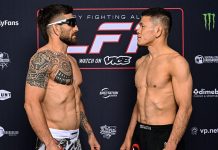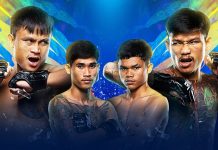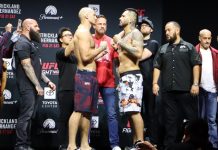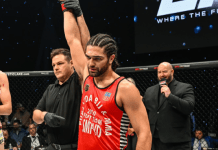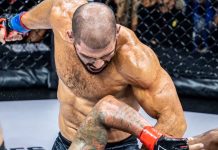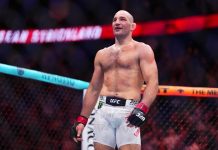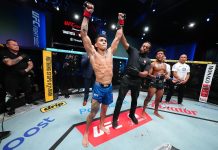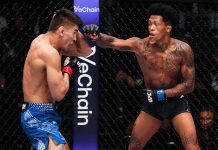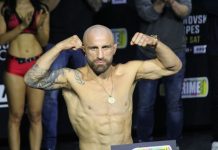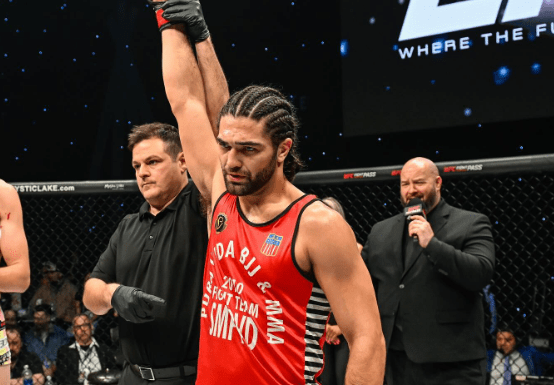While fights are the focus at UFC 250 this weekend, there’s more going on the in world. Much more. The coronavirus pandemic has impacted millions, and killed hundreds of thousands in mere months. And in America, civil unrest sparked by the death of George Floyd, an unarmed black man, at the hands of Minneapolis police officers has raged for over a week.
There’s so much more going on in the world than a fist fight, in other words. Alex Caceres — better known, perhaps, as Bruce Leeroy in the UFC — has a tough match-up with wunderkind Chase Hooper at this weekend’s event in Las Vegas. Yet as he prepares for that featured ESPN prelim, it’s hard to ignore the chaos in the world outside.
“The fight comes first. The art comes first for me,” explained Caceres (15-12, 1NC), speaking to Cageside Press during UFC 250’s virtual media day. “So I have been able to maintain focus. But I always keep an eye on the social uproars and all the stuff that’s going on in America. It’s not ever outside of my mind’s sight.”
Now especially, with wall-to-wall coverage and riots in multiple major U.S. cities, it’s hard to avoid it. “It’s nothing new to me, it’s been going on. And I’ve personally experienced things like racism and those kind of things,” Caceres continued. “So I know it’s prevalent in America. And it’s always been there. We’re just videotaping more of it, quite honestly, because we’ve got better cameras and phones, and everybody is documenting these things going down.” It’s been a problem, he said, for many, many years.
Minority communities, Caceres opined, should look into solving things by “really changing the way they think, changing the way they treat each other as well as their communities, instead of relying on somebody else outside of your community to maintain and make your community progress. You have to take that responsibility upon yourself.” America in general, he added, seems to think that because it’s not their responsibility to “end the task” — in this case, ending racism — “we devoid ourselves from any responsibility of beginning it.”
Recounting his own experiences with racism and the police, Caceres recalled a harrowing experience he went through as a young man, when he had a gun trained on him by a uniformed police officer. He’d grown up in a bad neighborhood, only to move to the suburbs later, which brought about what Caceres called an “identity crisis” spurred by comments on his skin color and hair. His encounters with law enforcement were even worse.
“I remember when I was in high school, I had a Honda Civic. I blew out a tire. And I think the engine just shut off, so I had to go push it home,” Caceres said. “And as I was pushing the car home, on the side or on the shoulder of the road, I’m pushing the car home, a cop comes and screeches right behind me to a screeching stop, jumps out of the car gun already drawn, pointing at me, and barking orders. What I could make out was, he wanted to see my ID. So my ID’s in the car, so I’m like, ‘I’m gonna go get my ID.’ The minute I stopped pushing the car to grab my ID, he clicks the trigger back, and is just like ‘don’t move!’ And I’m like, f*ck this shit. I’m gonna get on the ground and I’m not gonna do anything. You can grab my ID if you want.”
“On more than one occasion, situations like that have happened to me,” Caceres added, “so I lose a lot of faith in the people that are supposedly there to protect me. I feel threatened when a cop pulls up around me, or when they’re near me. Because I know how situations can escalate for no reason absolutely.”
Cacares recalled another instance where a police officer put him in a choke hold after an argument with a security guard at a school concert. Luckily, on that occasion, his superintendent and school counselor had his back. They recognized that you cannot treat people that way, as they’ll react in kind.
“We can’t expect people to walk around completely docile, you know, we’re human beings and we all are entitled to our own freedoms,” suggested Caceres. “And my freedom ends where yours begins. So we should stop trying to encroach on people’s freedoms that way. We can’t treat people like they’re cannon fodder, I should say.”
For now, however, Alex Caceres will put all that aside, and focus on Chase Hooper. Like Hooper, “Bruce Leeroy” himself entered the UFC at a young age. But he doesn’t think that will be a factor in how things turn out on Saturday.
“I haven’t really given that much thought. I don’t believe age has anything to do with it,” said Caceres. “He’s 9-0. So he has cage experience. I’m not sure that fight jitters might be a factor. I’ve never really tried to look for any other small types of advantages. I’m just going to solely rely on the skill and the experience that I have in order to come out on top.”
UFC 250 takes place this Saturday, June 6, at the UFC Apex in Las Vegas, Nevada. The main card airs live on PPV following prelims on ESPN (TSN in Canada).

